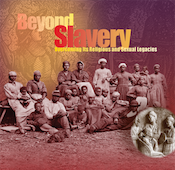Beyond Slavery
Explore the Conference
Explore the Conference by Subject
Slavery in Christian, Jewish, and Muslim Scripture and Religious Law
Christianity, Religion of the Slaveholders and the Enslaved
Sexual Assault and Exploitation Under U.S. Slavery and Jim Crow
How Slavery Has Shaped Our Understandings of Marriage and Friendship
Slavery, Violence, and the State
Beyond Slavery:
Overcoming Its Religious
& Sexual Legacy
Adrienne Davis:
Miscegenation and Morality: The Contemporary Politics & Racial Meanings of Marriage
Many Black church leaders who oppose gay marriage are insulted by comparisons with past laws that prohibited marriages between blacks and whites. Nevertheless, leading advocates of gay marriage frequently draw on the comparison. Although they disagree sharply on same-sex marriage, both of these camps assume that U.S. law prohibited all interracial sex and intimacy. Both sides also assume that laws outlawing marriages between blacks and whites (called "anti- miscegenation statutes") were the sexual, private version of Jim Crow laws in the public sphere, and that these laws kept the races apart in the bedroom, just as other segregation laws kept the races apart in the streets and on the buses.
For people who assume that these laws actually prevented interracial sex, allowing interracial marriage becomes a deeply moral act, a powerful stand against sexual racial apartheid.
But, as we now know from recent historical research on slavery and on the segregation era, while law prohibited interracial marriage, it authorized sex between white men and black women. Rules of rape and related laws allowed white men to commit sexual terrorism against the Black community with impunity.
This history still has echoes today. In this light, allowing interracial marriage is something different than an intensely moral act of protest against segregation. We need to take some of this great burden off of marriage; we should not see it as a centerpiece of progress in race relations and as a profoundly moral institution in itself. If we can look at marriage more soberly and realistically, we will have a much better basis for supporting same-sex marriage and for working to overcome the long-term sexual harm of slavery.
This video was recorded on October 15-16, 2006 as part of the conference, "Beyond Slavery: Overcoming Its Religious and Sexual Legacy." It was sponsored by the Feminist Sexual Ethics Project in the Near Eastern and Judaic Studies Department at Brandeis University.
